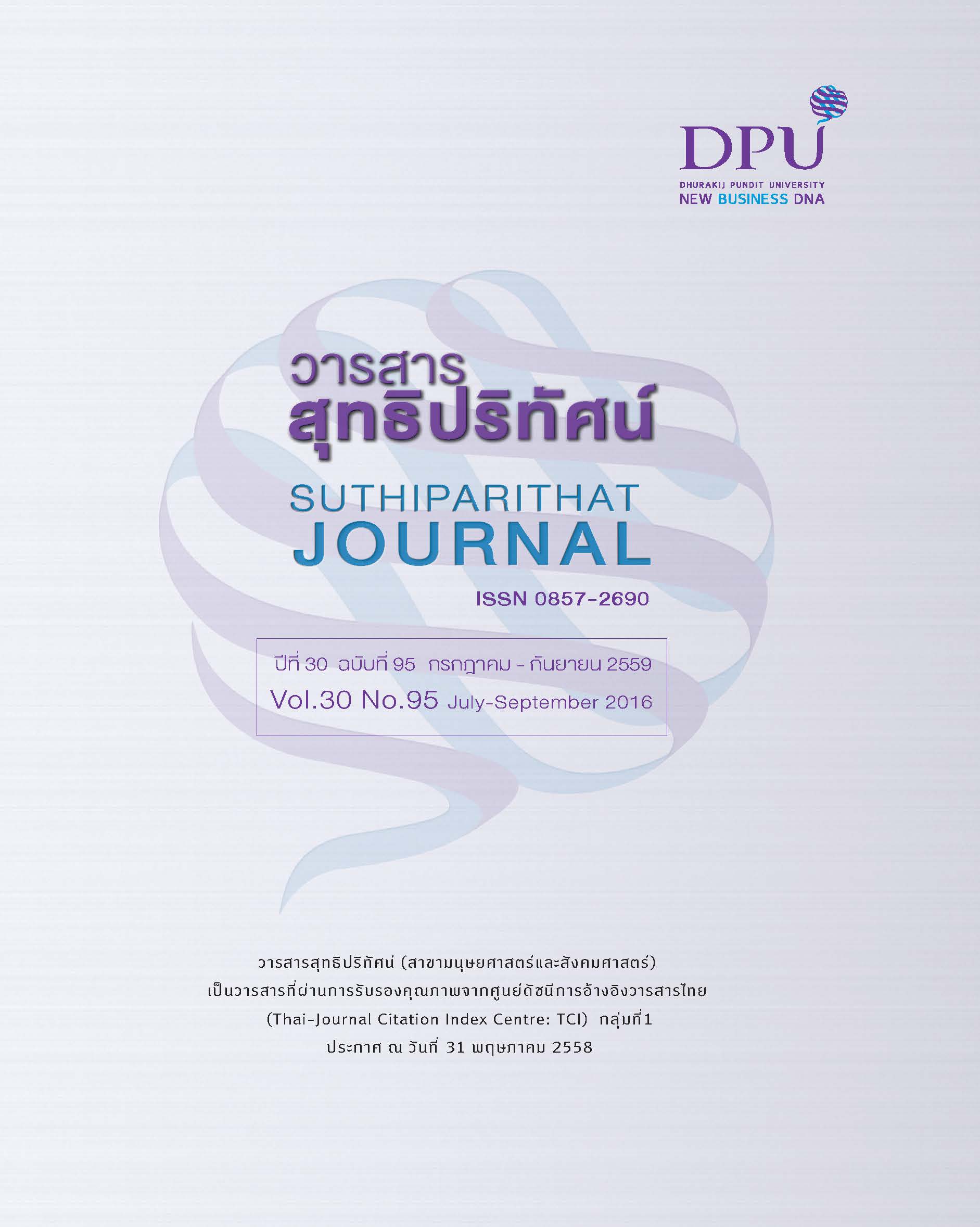บริบทสำคัญหรือไม่ในการเรียนรู้คำศัพท์
คำสำคัญ:
วิธีสอนแบบมีบริบท, วิธีสอนแบบนอกบริบท, คำศัพท์บทคัดย่อ
ความรู้เรื่องคำศัพท์ภาษาต่างประเทศนั้นมีส่วนสำคัญอย่างยิ่งในการศึกษาภาษาใดก็ตามให้ประสบความสำเร็จ อย่างไรก็ตามยังมีข้อถกเถียงกันอย่างมากในเรื่องวิธีการเรียนรู้คำศัพท์อย่างมีประสิทธิภาพ แม้ว่าการเรียนคำศัพท์แบบมีบริบทนั้นได้รับการยอมรับอย่างกว้างขวางว่าเป็นวิธีการที่มีประสิทธิภาพที่สุด แต่นักวิจัยจำนวนหนึ่งยังเชื่อว่าการเรียนคำศัพท์แบบนอกบริบทให้ผลลัพธ์ที่ดีกว่าในแง่ของการจดจำคำศัพท์ บทความนี้มีวัตถุประสงค์ที่จะนำเสนอแนวคิดการเรียนการสอนคำศัพท์ ทั้งสองแบบและประเด็นโต้แย้งเกี่ยวกับวิธีการสอนที่ดีที่สุด อย่างไรก็ตามการหาวิธีการที่ดีที่สุดเพียงหนึ่ง เดียวในการสอนคำศัพท์ให้กับทุกคนนั้นคงเป็นไปได้ยาก เพราะวิธีการสอนทั้งสองแบบสามารถเป็นวิธีที่มีประสิทธิภาพได้เท่าๆ กัน หากผู้สอนนำไปใช้ให้เหมาะสมกับบริบทและระดับความสามารถทางภาษาของผู้เรียน
เอกสารอ้างอิง
Amirian, S. & Momeni, S. (2012). Definition-based versus contextualized vocabulary learning. Theory and Practice in Language Studies, 2(11), 2302-2307.
Baicheng, Z. (2009). Do example sentences work in direct vocabulary learning? Issues in Educational Research, 19(2), 175-189.
Barcroft, J. (2000). The effects of sentence writing as semantic elaboration on the allocation of processing resources and second language lexical acquisition. (Doctoral dissertation). University of Illinois at Urbana-Champaign.
Carter, R. (1987). Vocabulary and second / foreign language teaching. Language Teaching, 20, 3-16.
Ciftci, H. & Uster, S. (2009). A comparative analysis of teaching vocabulary in context and by definition. Procedia-Social and Behavioral Sciences, 1(1), 1568-1572.
Coomber, J.E., Ramstad, D.A., & Sheets, D.R. (1986). Elaboration in vocabulary learning: A comparison of three rehearsal methods. Research in Teaching of English, 20(3), 281-293.
Gu, Y. (2003). Vocabulary learning in a second language: Person, task, context and strategies. Teaching English as a Second or Foreign Language, 7(2), 1-26.
Hulstjin, J. (1997). Mnemonic methods in foreign language vocabulary learning: Theoretical considerations and pedagogical implications. In Coady, J. and Huckin, T. (Eds.). Second language vocabulary acquisition. (pp.203-224). Cambridge: Cambridge University Press.
Laufer, B. (1997). The lexical plight in second language reading: Words you don’t know, words you think you know, and words you can’t guess. In Coady, J. and Huckin, T. (Eds.). Second language vocabulary acquisition. (pp.20-34). Cambridge: Cambridge University Press.
Laufer, B. (2009). What’s in a word that makes it hard or easy: some intralexical factors that affect the learning of words. In Schmitt, N. & McCarthy, M. (Eds.). Vocabulary: Description, acquisition and pedagogy. (pp. 140-155). Cambridge: Cambridge University Press.
Nassaji, H. (2004). The relationship between depth of vocabulary knowledge and L2 learners’ lexical inferencing strategy use and success. The Canadian Modern Language Review, 61, 107-134.
Nielsen, B. (n.d.). A review of research into vocabulary learning and acquisition. Retrieved June 16, 2015, from http://www.kushiro-ct.ac.jp/library/kiyo/kiyo36/Brian.pdf
Nist, S. & Simpson, M. (2001). Developing vocabulary for college thinking. New York: Allyn and Bacon.
Pressley, M., Levin, J.R., & Miller, G.E. (1982). The keyword method compared to alternative vocabulary learning strategies. Contemporary Educational Psychology, 7, 50-60.
Saengpakdeejit, R. (2014). Strategies for dealing with vocabulary learning problems by Thai university students. Silpakorn University Journal of Social Sciences, Humanities and Arts, 14(1), 147-167.
Scurfield, S. (2003). Give vocabulary learning a chance. Retrieved June 18, 2015, from http://www.tesol-spain.org/newsletter/scurfield.html.
Sinhaneti, K. & Kyaw, E.K. (2012). A study of the role of rote learning in vocabulary learning strategies of Burmese students. US-China Education Review A, 12, 987-1005.
Sokmen, A. J. (2009). Current trends in teaching second language vocabulary. In Schmitt, N. & McCarthy, M. (Eds.). Vocabulary: Description, acquisition and pedagogy. (pp. 237-257). Cambridge: Cambridge University Press.
Stein, M. (1995). The healthy inadequacy of contextual definition. In Huckin, T., Haynes, M., & Coady, J. (Eds.). Second language reading and vocabulary learning. (pp. 203-214). New Jersey: Ablex.
Webb, S. (2008). The effects of context on incidental vocabulary learning. Reading in a Foreign Language, 20(2), 232-245.
Yang, W. & Dai, W. (2011). Rote memorization of vocabulary and vocabulary development. English Language Teaching, 4(4), 61-64.
ดาวน์โหลด
เผยแพร่แล้ว
รูปแบบการอ้างอิง
ฉบับ
ประเภทบทความ
สัญญาอนุญาต
เนื้อหาและข้อมูลในบทความที่ลงตีพิมพ์ในวารสารสุทธิปริทัศน์ ถือเป็นข้อคิดเห็นและความรับผิดชอบของผู้เขียนบทความโดยตรงซึ่งกองบรรณาธิการวารสาร ไม่จำเป็นต้องเห็นด้วย หรือร่วมรับผิดชอบใด ๆ
บทความ ข้อมูล เนื้อหา รูปภาพ ฯลฯ ที่ได้รับการตีพิมพ์ในวารสารสุทธิปริทัศน์ ถือเป็นลิขสิทธิ์ของวารสารสุทธิปริทัศน์หากบุคคลหรือหน่วยงานใดต้องการนำทั้งหมดหรือส่วนหนึ่งส่วนใดไปเผยแพร่ต่อหรือเพื่อกระทำการใด ๆ จะต้องได้รับอนุญาตเป็นลายลักษณ์อักษรจากวารสารสุทธิปริทัศน์ก่อนเท่านั้น







